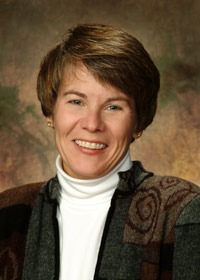Nancy Castle’s students were doing service learning before service learning was cool.
“Years ago I began sending my graduate students out to do things in the community that we’d later process in the classroom. It was a long time before I knew the name for that was service learning,” says Castle, who has taught in the School of Allied Health and Communicative Disorders for almost 20 years.
Since then, Castle has continued to feature service learning in of many of her classes, made it one of her primary areas for research and worked to incorporate it into the NIU Honors Program.
She is also an active member of the International Association for Research on Service Learning and Community Engagement, including working on the planning committee for the group’s 2011 international conference in Chicago.
Now, as the new “service-learning facilitator” for the Vice Provost’s Office on Engaged Learning she will share her wealth of knowledge on the topic with any faculty looking to incorporate such experiences into their classes. The job is in addition to her regular teaching duties.
The best service learning, she says, pushes students outside the boundaries of the norm, while providing a richer understanding of what they are learning. That is what separates service learning/engaged learning from experiences like internships or co-op work, she says.
“Internships and co-op programs are tremendous tools for providing students with first-hand experience. Service learning is part of that same set of tools, but with a twist. It adds a layer of reflection, compelling students to reflect upon what they have done that helps them better appreciate the real-world applications of classroom learning,” she says.
For instance, when Castle first talked about having her students “work in the community,” most assumed that would mean working with individuals who have disabilities. Instead, she had them assist an economic development group on a survey of local businesses.
“It changed their perception about employers’ knowledge about people with disabilitieswhich became the basis for great conversations in class,” Castle says.
In her new role, Castle will make herself available to assist those who are looking to incorporate service learning or community engagement into their classes. That help could run the gamut from simple brainstorming to assistance in developing a grading rubric and locating publication and presentation sources for faculty work.
Julia Spears, NIU’s coordinator of engaged learning, is excited to have Castle as a resource.
“When we were gathering the data that helped us meet the Carnegie standard for curricular engagement, we not only found hundreds of existing examples of engaged learning, but many, many more that came close to meeting the standard. Someone like Nancy can help close the loop for those classes, if faculty want to go that route,” Spears says.
While the new Carnegie designation places NIU in some elite company (only 311 schools nationwide have attained the distinction), there is still plenty of room to expand and improve, says Castle, who hopes to help further define service learning and community engagement at NIU and more thoroughly incorporate it into the university culture.
For more information, contact Castle at (815) 753-9126 or via e-mail at ncastle@niu.edu.
Related:
Carnegie Foundation recognizes NIU’s excellence in providing opportunities for engaged learning

